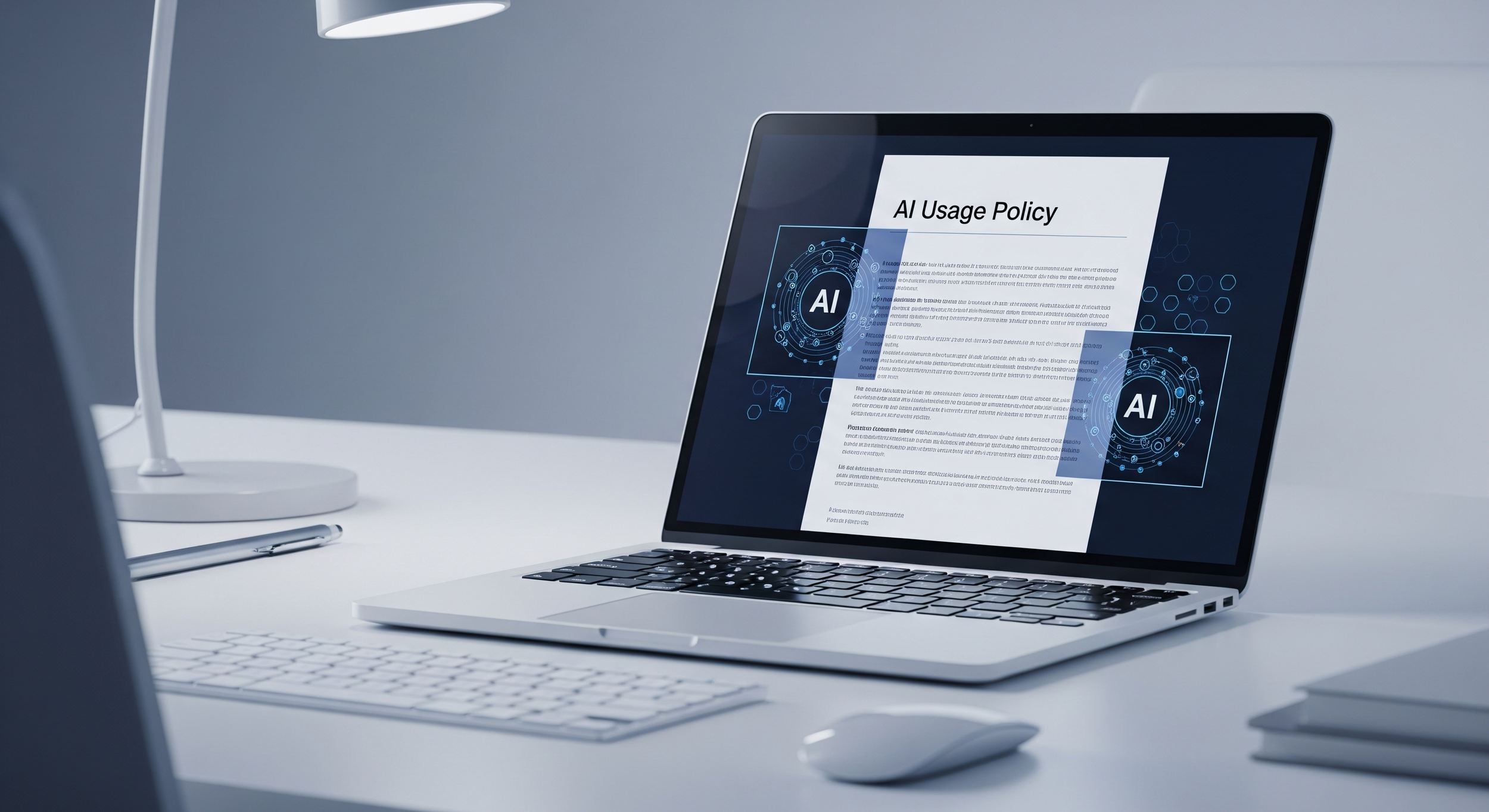Why We Created an AI Usage Policy — and Why You Probably Should Too
AI is everywhere.
It’s helping you write emails, serve ads, summarize documents, and plan campaigns — often without you even realizing it.
The truth is, most businesses today are using AI tools to some degree. Yet very few are openly acknowledging that use — and even fewer have a policy to govern it.
At RightNow Communications, we decided it was time to change that.
This post will walk you through:
Why we created an AI usage policy
What’s actually in it
Why your business probably needs one, too
And how you can use AI to help create it
AI Is Here (Whether We Admit It or Not)
The use of artificial intelligence in marketing isn’t a trend. It’s infrastructure.
From AI-driven ad bidding in Google and Meta, to generative tools like ChatGPT, Jasper, and Notion AI, we’re surrounded by automation that’s making decisions, shaping content, and influencing outcomes.
And while there’s no current law that says your company needs an “AI policy,” we believe that transparency is quickly becoming a trust signal — for your clients, your audience, and even the platforms where your brand appears.
So we wrote one!
Not because we had to.
Because we believe the brands that lead on trust will be the ones audiences follow.
Why We Wrote an AI Policy at RightNow
Let’s be clear: this wasn’t about compliance theater.
It was about clarity — for our team, our clients, and our readers.
As our use of AI tools increased, so did the questions:
Where are we using AI?
Are we labeling AI-assisted content?
What’s the boundary between human creativity and machine-generated suggestions?
Are the platforms we use (Google Ads, Meta, LinkedIn) already applying AI behind the scenes?
We realized we needed to define our position — before someone else asked us to.
So we did. We wrote and published our AI Usage Policy as part of our public-facing site and internal governance. It's honest, practical, and human.
And now we’re encouraging others to do the same.
What’s in Our AI Usage Policy
Our policy isn’t a legal document buried in fine print.
It’s a clear, reader-friendly explanation of how we use AI — and how we don’t.
Here’s what it includes:
Where we use AI: for content outlines, email subject lines, ad copy drafts, and summarization
What we never do: publish unedited AI content, fake testimonials, or share client data with generative tools
Oversight: human review is required for all published content
Advertising platforms: acknowledgment that AI is embedded in tools like Google Ads and Meta — and we don’t control their use of it
Current stance on labeling: we don’t label AI-assisted content today, but we’re exploring how to do so responsibly in the future
Privacy considerations: we don’t feed private or sensitive client information into AI systems
You can read the full policy here: RightNow AI Use Policy
It’s not complicated. It’s just honest.
Here’s Why Your Brand Probably Needs One Too
We’ll say it directly: If your company is using AI in any capacity, you need to disclose it.
That doesn’t mean writing a 5,000-word legal doc.
It means giving your clients, team, and audience clarity about how you’re using one of the most powerful technologies on the planet.
Here’s why:
1. You’re Already Using It
If you’re running Google Ads, Meta campaigns, or even email through modern platforms — AI is involved. Period.
2. The Silence Will Catch Up to You
As regulations (like the EU AI Act, FTC guidance, or emerging U.S. frameworks) start to tighten, the brands that said nothing may find themselves behind — legally and reputationally.
3. Search Engines Are Watching
Google’s Search Generative Experience (SGE) is evolving. Sites that signal transparency, trustworthiness, and ethical content practices will likely gain an edge — especially in YMYL (Your Money or Your Life) verticals. The Google Views on AI Policy provides its outline and vision for the use of AI.
4. You Can Lead Instead of Defend
Publishing an AI usage policy isn’t just defensive. It positions your brand as thoughtful, mature, and proactive. It says: “We’ve thought this through.”
And most of your competitors haven’t.
What Your AI Policy Should Include
You don’t need to overthink this.
Here’s a simple, credible structure to get you started:
Purpose: Why you're creating the policy
Scope: Where AI is used (content, email, ads, etc.)
Oversight: Who reviews AI-assisted content before it’s published
What you don’t use AI for: (e.g., testimonials, sensitive data)
Third-party platforms: Acknowledge use of AI in advertising, social, analytics tools
Privacy: Your standards around data handling in AI workflows
Labeling: Whether or not you label AI-assisted content today
Governance: Your intent to review and improve the policy as tools evolve
That’s it. Clear, specific, and real.
You don’t need legalese. You need language your team and your clients can understand and trust.
Use AI (Yes, Really) to Help You Write Your AI Policy
This might feel ironic — but it’s smart.
The same AI tools you’re using to generate outlines, posts, and client reports can also help you draft your own AI Usage Policy.
Prompt a tool like ChatGPT to:
Draft your policy structure
List common use cases of AI in your workflow
Suggest ethical boundaries
Write in your brand voice
If you’ve built a custom GPT (like we did), even better — it can tailor policy drafts to your voice, industry, and risk tolerance.
The key is this: you still need a human editor.
AI can get you started. But only you can define what you stand for.
Use AI to help write your policy — not avoid it.
FAQ | Frequently Asked Questions about AI Use Policies
Q: Can you suggest a prompt to create an AI usage policy?
A: Yes. If you're using a tool like ChatGPT, Claude, or a custom GPT, here’s a ready-to-use prompt to help you draft your AI Usage Policy from scratch:
Here is Your Free Prompt Template:
“I represent a company called [Your Business Name], with the website [Your URL]. We use AI for tasks such as [e.g., content generation, internal research, ad copy optimization, social media scheduling, etc.]. Please generate a clear, professional AI Usage Policy that includes:
Where AI is used
What tasks are human-only
Whether content is labeled as AI-assisted
How human review is handled
How we use AI-integrated platforms like Google Ads or Meta
Privacy and data protection boundaries
Keep the tone trustworthy, brand-safe, and easy for clients and readers to understand.”
You can refine the result to reflect your exact workflows, policies, and tone of voice.
-
An AI Usage Policy is a public-facing statement that explains how your organization uses artificial intelligence in its operations. It outlines where AI is used (e.g., content creation, advertising), the role of human oversight, any limitations or exclusions, and your stance on content labeling or disclosure. It’s meant to build trust with clients, audiences, and platforms.
-
If your business uses AI in any way — especially in content, communication, or advertising — then yes, you should have a clear AI Usage Policy. It helps set expectations, protect trust, and demonstrate maturity in your operations. Even a short, honest policy can make a difference.
-
Yes. Google Ads, Meta, and other digital platforms use AI and machine learning by default to optimize bidding, targeting, and creative delivery. Advertisers do not have full control over how these systems apply AI. Acknowledging this in your AI policy increases transparency.
-
Google doesn’t penalize AI-generated content by default. However, content quality and trustworthiness are key. Disclosing AI usage — especially in sensitive industries — can enhance credibility and help support Google’s E-E-A-T (Experience, Expertise, Authoritativeness, Trust) signals, which influence ranking.
-
There’s no legal requirement (at the time of writing), but labeling AI-generated or AI-assisted content can help build trust. Some brands choose to disclose only when content is primarily AI-authored; others disclose general use via a policy. Your approach should be consistent and transparent.
-
A strong AI policy usually covers:
Where AI is used (content, email, ads)
Human review processes
Tasks AI is not used for (e.g., legal statements, testimonials)
Privacy/data handling standards
Use of AI-powered platforms (e.g., Google Ads)
Content labeling position
A statement about future policy reviews
-
Yes. Tools like ChatGPT or a custom GPT trained on your brand can generate a draft AI Usage Policy quickly. Just ensure a human reviews and edits it to reflect your actual practices and tone. It’s a great way to move from blank page to usable draft.
-
Staying silent can undermine trust. You risk audience backlash, regulatory challenges, and credibility issues — especially if your AI usage is discovered later. Transparent brands will likely be more resilient as AI governance and platform expectations evolve.
-
No. Whether you're a solo founder using Jasper or an agency running Meta ads, if AI plays a role in your operations, a basic usage policy is a smart move. It’s about trust, not tech sophistication.
-
Not directly, but yes indirectly. Having an AI Usage Policy strengthens your trust signals (E-E-A-T) and aligns with Google’s push for content transparency. It can help you qualify for SGE visibility, rich snippets, and establish brand credibility.
Final Thought: The Sooner You Do This, the Stronger You’ll Lead
Creating and publishing your AI usage policy isn’t about checking a box.
It’s about signaling:
That your brand is aware
That your team is aligned
That you’ve thought critically about the tools you're using
And that your clients can trust the work you produce
We didn’t publish ours because we had to.
We did it because trust is a competitive advantage — and this is one of the clearest ways to earn it in a post-AI marketing world.
TL | DR
AI is part of modern marketing — and your audience is starting to notice
We created a public AI Usage Policy to provide clarity and leadership
Your brand probably needs one, too
You can use tools like ChatGPT to help write it
The brands that act now will lead later
If you want to talk about building your own AI Usage Policy — or want help reviewing a draft — get in touch. We’ve walked this road. We’ll show you the way.


